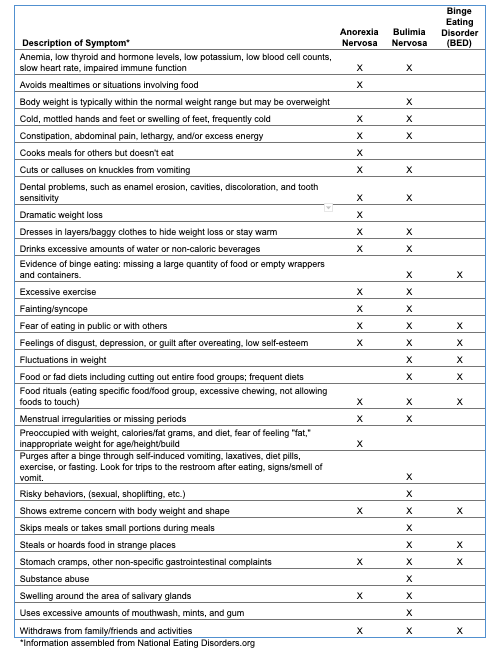Food. We have a love-hate relationship with it. But for some, the relationship has become unhealthy.
Causes of Eating Disorders
Eating disorders are usually a sign of a deeper mental health issue; it isn't really about the food, and often it isn't about the need to be skinny. There are indicators that biological and societal factors can influence who fall prey to an eating disorder, and that gender, age, ethnicity, or financial position do not determine who will be afflicted. In a nutshell, the cause is complicated. One thing is for sure; they are not a choice and the one fighting the illness is not at fault.
Types of Eating Disorders
According to the Eating Disorders Coalition, 30 million Americans suffer from an eating disorder, and at least 23 people die every day as a direct result of this illness.
There are three categories of eating disorders that most people have heard of:
-
Anorexia Nervosa - severe weight loss as the result of starvation or exercise
-
Bulimia Nervosa - bingeing and purging food
-
Binge Eating Disorder (BED) - frequently eating excessive quantities of food
There are also a few lesser known such as Pica (eating items that are not food, such as hair, dirt, paint chips, or soap), Orthorexia (fixation on "healthy eating" to the point of being unhealthy), and Rumination Disorder (regurgitated food that is re-chewed, re-swallowed, or spit-out). BED is the most common eating disorder in the U.S. and is even more common than breast cancer.
Symptoms of an Eating Disorder
Would you be able to identify symptoms of an eating disorder in a friend or family member, or even in yourself? The sooner an eating disorder is caught, the better the chances for recovery.
This chart doesn't list all of the warning signs of an eating disorder, and not everyone suffers from every symptom. But it is a place to start. The best thing we can do is understand, encourage, support, and seek help if we suspect an eating disorder.
There are many great support groups out there, as well as psychologists who specialize in this type of illness. Websites such as 7 Cups strive to provide information and offer support services through their community, listener and online therapy programs. Don't be afraid to lean on your friends and family, and please, contact a professional if you suspect that you or a loved one is fighting this fierce battle.
For additional support, join our empathetic community, chat with a free, trained listener standing by, or start working with an online therapist today.

